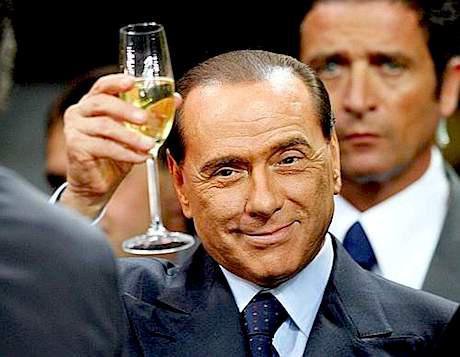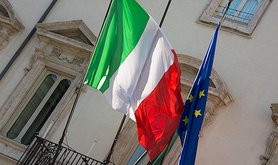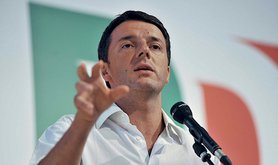
Flickr/Lorenzo Pierini. Some rights reserved.
It seems like an irony of fate that in many countries the forthcoming elections to the European Parliament have acquired unprecedented importance, precisely at a moment when the European Union’s prestige and popularity are at an all-time low. Contrary to the habitual trend, the campaign actually tackles European issues – particularly the presumed evils of the Euro - and these elections, therefore, are more than an unofficial referendum on the popularity of the political parties in government or in opposition.
This is, however, only partially true in Italy, where the European elections are acquiring importance because they could well constitute a watershed in the long and chequered political career of Silvio Berlusconi. As a convicted felon, the former Prime Minister will not be allowed to have his name on the ballot - or even to vote. The elections will also be something of a popularity contest for the ruling Democratic Party, and for the unpredictable Five Star Movement (M5S), led by former comedian Beppe Grillo. M5S came second (behind the Democratic Party) in the February 2013 elections – will it triumph this time?
The curious case of Silvio Berlusconi
Last fall, many thought that Berlusconi’s colourful career had finally come to an end. A Milan appeals court sentenced the former PM to a two year ban from public office, in addition to the four year sentence previously inflicted for tax fraud. This sentence deprives Mr Berlusconi of all immunity granted to him by his Senator mandate and could, according to his supporters, open the floodgates for a barrage of legal proceedings aimed at finishing him off. They argue this would condemn him – as he himself put it in one of his many successful attempts at pathos – to face a situation similar to Yulia Tymoshenko's, ”to rot in a prison cell as a result of political-judicial persecution”.
The law, however, has been much more lenient than that, and his sentence has since been reduced to less than a year. Berlusconi will, however, have to dedicate half a day a week to social work, in addition to his movements being limited (he is not allowed to leave the country, or even to leave his home except for some appointed days and with the obligation to be home from 11 pm till 6 am). He has also been expelled from the Senate and would have been stripped from his title of “Cavaliere” (the Italian order of knighthood) if he had not himself renounced it. These measures are extremely humiliating, but they have not stopped Berlusconi from spearheading his party's symbol for the forthcoming European elections. Nor have they stopped Berlusconi – who is himself unable to stand for office or vote – from launching a vigorous electoral campaign, in which his stance efficiently alternates between pathos and truculence.
This is where the Berlusconi case becomes interesting. Reading comments in the press – both Italian and international – one would quickly understand that, in spite of this show of resilience, the seemingly indestructible Berlusconi has come to the end of his political road. It would, at the same time, be advisable to keep in mind that no current political figure has been declared “politically dead” – usually with good reason – as often as Berlusconi. He has nevertheless always managed to survive and to amaze both friends and adversaries by his resilience in staging “impossible” comebacks. This is because Berlusconi could be defined as the quintessential populist, and populist messages acquire particular strength in periods of crisis.
Berlusconi's future
The intricacies of the Italian judiciary, as well as the chaotic political situation in Italy, ought to invite observers to caution before reaching any conclusion about the future of Mr Berlusconi. The former PM finds himself faced with a “make or break” situation which will make his actions even less predictable than usual.
His formerly monolithic political party, “Forza Italia”, is experiencing an internal crisis and a growing number of defections, some of which by leading personalities. At this time, it appears that Forza Italia pursues the relatively modest aim of reaching 20 percent of the vote, accepting its fate as the nation’s third party. But current opinion polls cast doubts even on the modest ambitions of a party which, for the past two decades, has either won or reached second place, its share of the vote being constantly over 30 percent, except in the most recent elections. But even in the 2013 case, Berlusconi amazed his critics by climbing from a predicted 11 percent in the polls to the ideal role of king-maker and spoiler.
Berlusconi’s trademark has always been a last minute surge in public sympathy. The party now aims to capture the massive 40 percent of the voters who are growingly disenchanted by politics and, as a result, are either undecided or potential non-voters. Berlusconi, in a recent television interview, expressed confidence at his party’s ability to reach the 25 percent mark.
In sentencing Berlusconi, the court pointed out that, should he continue in his fierce attacks on the Italian judiciary, and should he deviate from the terms of this extremely mild sentence, the court could well revise its position and modify the sentence to that of house arrest, which would even more severely curtail his movements and make it almost impossible for him to meet members of his own party. Berlusconi is currently playing a rather risky game of cat and mouse with the judiciary, by issuing provocative remarks but stopping just before infringing upon the terms of his sentence. It has to be added that – as Berlusconi himself pointed out – a house arrest sentence would boost his image as a victim of persecution and, in his estimation, gain his party an extra 5 percent or more of the vote. Berlusconi also benefits from abundant publicity, as news programmes and political commentators analyze every one of his statements. These would otherwise have been lost in the plethora of electoral proclamations - which has already reached considerable proportions, with almost three weeks to go before the elections.
Towards early elections?
True to long-lasting Italian political tradition, the situation is even more complex given the strange alliance recently concluded between Berlusconi and the new, youthful PM Matteo Renzi. Berlusconi, although still in the opposition, has vowed to give the government his support in passing some reforms, thus ensuring a parliamentary majority which could have collapsed because of opposition from Renzi's allies, who view some of the proposed measures (for example eliminating the Senate) as ultimately unpopular with the public.
But in the past few days, Berlusconi – following his remarkable political acumen - has cast doubt upon the validity of the agreements reached with Renzi in the course of well staged television appearances. This creates the risk of a major government crisis with the need to go to early political elections, thus annihilating the carefully constructed projects on which Renzi has staked his political future.
Berlusconi still has enormous control over the media, and his appearances on television far outnumber those of his opponent. But this situation might soon evolve because of a new, seldom mentioned development. The audiences of Berlusconi's TV appearances have been dropping dramatically, as the Italian public seems to be losing interest in the man who has dominated the political scene for over two decades. This development is often overlooked because of the general fascination that Berlusconi still exerts on journalists and commentators, but which is not really shared by the public at large.
The situation would be far less dramatic – even mildly amusing – if it were not for the desperate state of the Italian economy. The calling of early elections is not an impossible scenario given the volatility of Berlusconi’s relationship with the governing coalition. But no matter what their outcome, these elections, and the ensuing instability, could have disastrous effects for Italy on the internal front and in its relations with European partners, who are looking at the country with some concern.
Read more
Get our weekly email





Comments
We encourage anyone to comment, please consult the oD commenting guidelines if you have any questions.